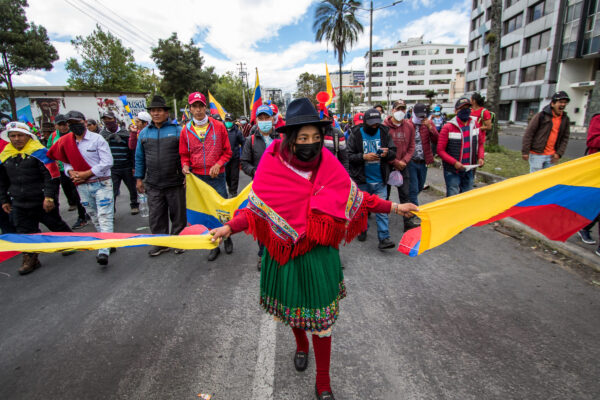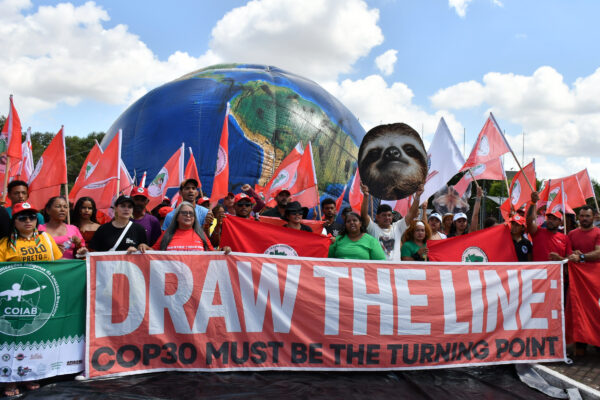Photos available on request
Quito, Ecuador – Some 75 protesters gathered outside the Oil and Energy Conference at the Marriott Hotel in Quito yesterday where meetings took place in a final push by the Ecuadorian government to auction off 13 oil blocks that are part of the 11th Round of oil-licensing covering over six million acres of rainforest in the Amazonian provinces of Pastaza and Morona Santiago near the border with Peru. The region is Ecuador’s last remaining tract of virgin rainforest and is home to seven indigenous nationalities. Attempts to lease it have been plagued by a transnational oil spill, global protests, wary investors, deadline extensions and other setbacks. The Ecuadorian government has said that it will close the oil round with a final bidding deadline of November 28th.
Led by the regional indigenous confederation GONOAE and the national indigenous umbrella group CONAIE, protestors representing seven indigenous communities say that they are against oil activity on their ancestral lands, which they claim will be affected by the exploration. The nationalities have promised that they would exercise their constitutional right to “firmly resist any oil companies that try to enter [their] territories.” CONAIE is responsible for the ousting of several former presidents, derailing free trade agreements and leading major uprisings that have influenced public policy.
The communities claim that they were not properly consulted around the negotiations, while under Ecuadorian law consultations with indigenous communities must take place prior to developments on indigenous territory. While six indigenous representatives entered the official conference yesterday, their questions were censored and remained unanswered by government officials.
“In the Southern-Central Amazon, we do not support the 11th Round or the exploration of oil on our territories. We will continue to defend our territories from these threats that do not benefit our communities or our forests,” said Franco Viteri, the Kichwa President of the Governing Organization of the Indigenous Nationalities of the Ecuadorian Amazon (GONOAE).
“Yesterday, the government ratified the political will and decision to explore southeastern Ecuador,” said coordinator of Strategic Resources Rafael Poveda, whose ministry also said that “the most responsible thing we can do for the country and future generations is to exploit oil in this region.”
These lands have been the site of some of the fiercest conflicts between local and indigenous groups, the state, and oil companies. Ecuador has previously offered many of the blocks currently included in the 11th Round, but received no bids and was forced to cancel the tender. This was, in part, due to local opposition that paralyzed operations for close to a decade, including those of companies like ARCO, Burlington, ConocoPhillips, CGC and Perenco.
The auction’s opening in November 2012 was met with fierce protests in Quito, and global protests against the round have garnered widespread international media attention. In Fall of 2012, partly due to their loss at the IACHR, the government of Ecuador was forced to remove five of the most controversial oil blocks from the original tender. In March, it reduced expectations even further by stating that it was expecting bids on only six to ten oil blocks (down from the original 21). In late April, presumably because it had not received enough interest from potential bidders, the government announced that it would extend the deadline for companies to offer bids. Two days later, Wilson Pastor, the minister who was in charge of the oil round, announced his resignation.
All of these setbacks have led some analysts to predict that Chinese companies may be the only ones that will dare to bet on the controversial blocks. While Chinese law would outlaw its participation in the round, China has loaned Ecuador over $7 billion dollars and the terms of the loans require that Ecuador repay China in oil.
Analytica Investments’ Weekly Ecuador Report cites industry executives who say that “the risk of unrest and legal challenges hampers the outlook for a successful tender,” and even the Ecuadorian government has labeled the blocks “high risk,” noting that only one in three exploratory wells is likely to find oil in the southeast. The state never conducted a consultation process in accord with Ecuador Presidential Decree 1247, nor the standard set by the Inter-American Court on Human Rights (IACHR) in the Sarayaku v. Ecuador case, which the current administration of Rafael Correa has stated it would respect. Numerous court cases have been brought against the Ecuadorian government and companies operating in the Ecuadorian Amazon, including the $9.5 billion ruling against Chevron for its environmental and public health disaster in the northern Amazon. Companies have faced legal injunctions that have led to work stoppages, project delays, and new litigation using Ecuador’s progressive constitution that declares nature a rights bearing entity.
“This would simply be a bad investment,” said Leila Salazar-Lopez, Program Director at Amazon Watch. “Ecuador is selling off its last remaining rainforests and indigenous territories to the highest bidder. Instead of protecting its rainforest, defending rights and investing in alternatives, the government is inciting resistance that will result in a major financial liability for companies seeking to develop. Companies must realize they are purchasing a problem that will only get worse.”
Following yesterday’s Oil and Energy Conference, Zoila Castro, Kichwa from Sarayaku, declared, “Women are at the forefront of the struggle. We’re not going to allow oil development to contaminate our land and we’re not going to allow foreign companies to come and take our oil. We’re not going to be in peace until this stops. We’re not giving up. We’re going to fight until the ultimate consequence.”
A press conference is scheduled today at 4:30pm at the Auditorium of the Philosophy Department at the Central University in Quito. It will be followed by a public event entitled, 11th Oil Round: Change the Energy Matrix or Reaffirm our Dependence on Oil.












